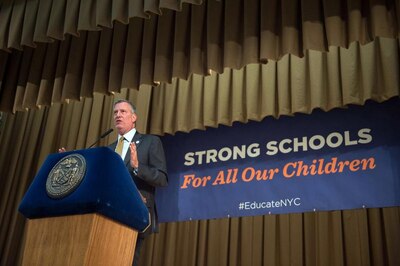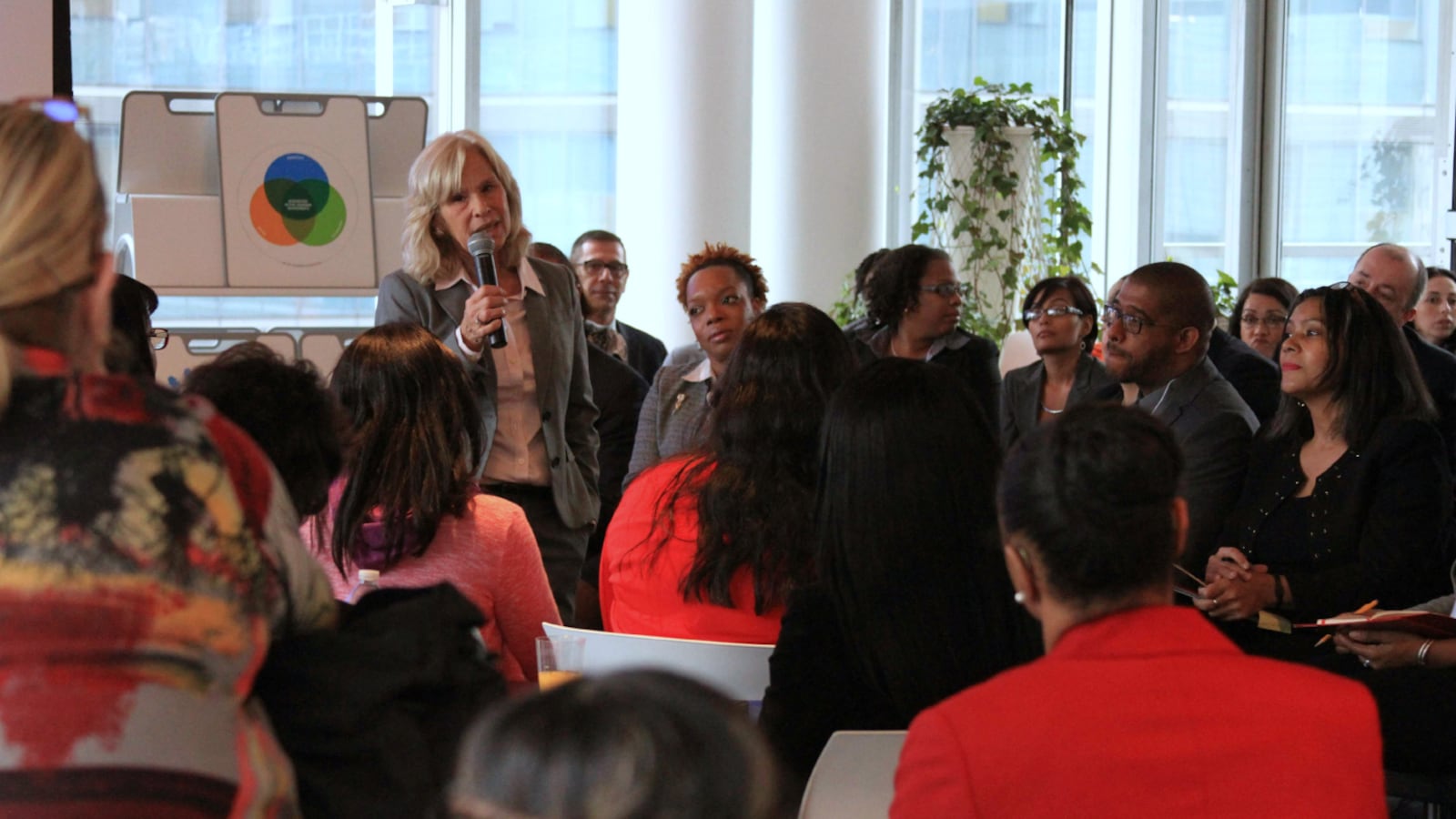Months after the high-profile launch of a $150 million turnaround program for struggling schools, the city has heaped extra supports on some of the schools while others are still waiting for the intensive help they expected.
Mayor Bill de Blasio faces pressure from the state to prove that his “School Renewal” program can quickly revamp those schools — including from some state lawmakers and Gov. Andrew Cuomo, who is pushing a plan to let outside groups take over troubled schools across the state. Last week, de Blasio told state lawmakers that plan was unnecessary in New York City because his program will provide the 94 low-performing schools in the Renewal program with “extraordinary support” and will close those that do not improve within three years.
But even though that countdown has started for all the schools, only a portion have received serious help since the program kicked off in November, according to principals and other staffers at those schools.
A group of high-priority schools within the Renewal program — including some that were part of the de Blasio administration’s first turnaround effort — have been assigned principal mentors and teacher coaches, assessed by city officials and given specific goals for this year, and sent fewer challenging students. Meanwhile, some other Renewal schools have only met with program officials once, have not been given specific targets, and have not been assigned mentors or coaches.
“It’s March and we don’t even have a plan,” said one principal who, like others interviewed, spoke on the condition of anonymity. “And this is considered year one of the intervention.”
All the schools in the Renewal program were flagged by the state for poor performance, with many required to enact top-to-bottom reforms this year. Each ranked among the lowest quarter of city schools for the past three years based on student test scores and graduation rates, according to the city. Still, some have received more attention than others.
Those schools include ones that were part of an initial turnaround effort targeting 23 schools, which the education department quietly launched at the start of the school year before folding it into the Renewal program. High schools in that original effort, dubbed the “School Achievement Initiative,” were placed under the oversight of a single superintendent, assigned turnaround directors, and had teachers trained in an approach to writing instruction pioneered by New Dorp High School in Staten Island.
One of those schools is Richmond Hill High School in Queens. The city has sent it a retired principal to act as a leadership coach, along with math and literacy coaches for teachers; dispatched officials to periodically monitor the school’s progress; agreed not to send it students who had to leave their previous schools for safety reasons; and given it extra funding, which the school has used to add after-school and Saturday sessions for students, according to the principal and Stephen Duch, the principal’s leadership coach.
Duch said the state identified Richmond Hill and other schools in that first initiative early last year as ones in need of rapid improvements. As a result, they have enjoyed earlier and more sustained support from the city than other Renewal schools, according to Duch and others familiar with the high-priority schools.
“There’s two tiers” in the Renewal program, Duch said. (Education department officials deny that there are formal tiers within the program.)

While the city has been deeply involved with that subset of schools, administrators and staffers at four other Renewal schools say they have noticed few changes since it was launched last fall.
Three of the schools reported meeting only once with Renewal officials so far. (The fourth, which was part of the School Achievement Initiative, said the burst of attention it received at the start of school year quickly fizzled.) The city has not provided the schools with principal mentors, teacher coaches, or improvement goals for the year, according to people at those schools.
The city has organized training workshops for Renewal schools. However, they have been off-site meetings that schools can send representatives to, not the intensive school-based coaching that some schools expected. One of those was a daylong conference last month hosted by the Teachers College Reading and Writing Project, which provided an overview of that group’s literacy approach, an attendee said. The person was told that the Reading and Writing Project will host a total of five such sessions for Renewal schools this year, but will not offer coaching at his school as teachers try the approach.
“So far we’re jumping through the hoops,” said the Renewal school staffer, “but nothing’s actually happening at our school.”
Education department officials said they are tailoring their support based on each school’s needs, but that all 94 Renewal schools are getting help.
For instance, the schools have sent a total of 600 staffers to the city’s training conferences, and all have some type of after-school program in place, such as tutoring, test prep, or arts classes. They are beginning to participate in a review by outside researchers that will include teacher interviews, officials said, though a recent email to principals said the researchers will not visit classrooms until next school year.
This spring, the schools will get extra funding to help them craft improvement plans for next school year, and will be partnered with outside groups that will help them add health and social services, officials said. Eventually, all the schools will be assigned leadership coaches, they added.
“Schools across the city are receiving professional development and individualized plans to turn around these historically failing schools,” said department spokeswoman Devora Kaye, adding that a “one-size-fits-all approach” did not help the schools improve in the past. “If there are not results, all options are on the table to ensure our students are getting the high quality education they deserve.”
One upgrade that de Blasio has repeatedly promised all the Renewal schools is “an additional hour of instructional time for every child, every day,” as he told lawmakers last week. But principals union officials said that will require negotiations that have yet to occur. And teachers union president Michael Mulgrew said Wednesday that the logistics of adding an extra hour will not be worked out until after the city finishes analyzing each school’s strengths and weaknesses.
“This is all planning and needs assessments right now,” he said.
Kaye, the department spokeswoman, would not say when schools will get the extra hour.
While most Renewal schools are still in the early planning stage, those that have already received robust support since the start of the school year say they are making progress. Duch, the leadership coach assigned to Richmond Hill High School, said he has already seen “tremendous, tremendous growth.” The school’s principal, Neil Ganesh, agreed.
“I have received extensive support from the [Department of Education],” he said in an email, “and I’m pleased to say we are already seeing results.”

